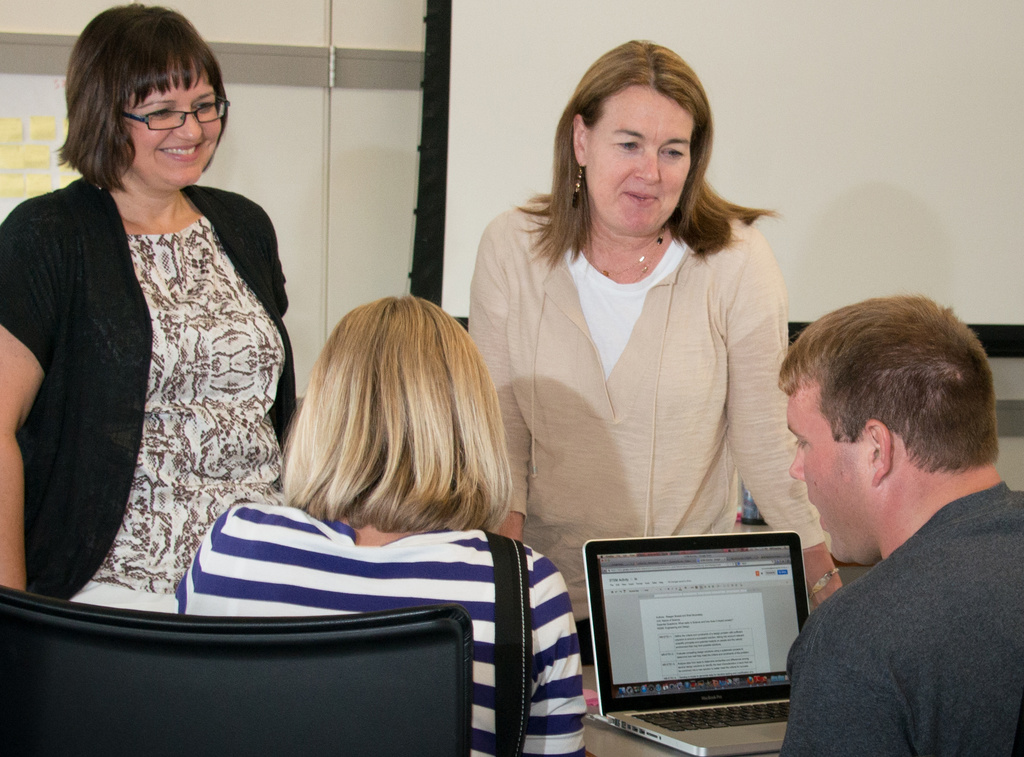
The University of Iowa colleges of education and business are partnering to develop new ways of teaching entrepreneurship as part of the Iowa Governor’s STEM Initiative.
The collaborative project was supported with a $250,000 grant from a pool of funds from a new strategic initiative in entrepreneurship from the State of Iowa. The project started this month with an institute for teachers who will serve as leaders across the state in envisioning and implementing STEM entrepreneurship curricula.
“This project is rewarding for us at the University of Iowa because it is an example of direct outreach—we will have an impact in classrooms in all parts of the state,” says Dawn Bowlus, director of the Jacobson Institute for Youth Entrepreneurship at the Tippie College of Business.
Bowlus facilitated the teachers’ workshop along with Leslie Flynn, a clinical associate professor in Science Education and administrator of STEM initiatives at the College of Education’s Belin-Blank International Center for Gifted Education and Talent Development.
STEM is an acronym for Science, Technology, Engineering, and Math. The governor’s initiative, led by an advisory council that includes UI President Sally Mason, identified priorities for improving STEM education in the state. Many of those priorities have increased economic development and opportunities for Iowans as an end goal.
The initiative divides the state into six geographical regions. The UI and Kirkwood Community College lead the southeast Iowa region.
To work toward achieving initiative goals, southeast Iowa STEM teachers along with teachers in business, special education, and agriculture met August 5-8 in Iowa City for the STEM Entrepreneurship Leadership Institute for K-12 Teachers.
The group was charged with designing activities and curricula that could infuse K-12 STEM education statewide with an entrepreneurial spirit and build connections between district and community partners.
Flynn says it’s exciting to connect Iowa teachers with all of the resources the UI has to offer.
“Any area the teachers want to explore in their classrooms, we can do that here at the University of Iowa,” she says. “We are fortunate to have amazing resources in terms of experts in a diverse range of fields.”
Shannon Guyer, a special educator teacher at Monticello High School, developed an interdisciplinary STEM entrepreneurship project that could bring her whole school together to design, produce, promote, and sell soap.
Shannon Guyer, a special educator teacher at Monticello High School, developed an interdisciplinary STEM entrepreneurship project that could bring her whole school together to design, produce, promote, and sell soap.
“I’m proposing a cross-curricular effort to create a school-wide business,” she says.
Project SOAP (Synthesizing Opportunities Across Professions) would involve her special education students as “general contractors” and leaders on the project. Agricultural students would grow ingredients to be used in the product. Mathematics students would design and calculate the mold and packaging requirements using geometric concepts. Manufacturing students would create the molds and packaging. Language arts students would develop advertising and fundraising campaigns. Art students would design logos and illustrations for ads. Accounting students would keep track of the finances.
Guyer says she gained a lot by participating in the institute at the UI, including collaborating with other teachers and realizing that she’s part of a larger network.
“The big takeaway for me was I don’t have to do everything,” she says. “I can network with other teachers and we can work as a team to meet these big goals.”
Flynn says interdisciplinary projects like Guyer’s help students see the connections between STEM skills and other fields.
“Although some students may not feel they have an interest in STEM or plan to pursue degrees in a STEM field, many of them will be interested in areas of business and in the entrepreneurial spirit of creativity, tenacity, intuition, and persuasive communication skills,” Flynn says. “Attending to these interests and competencies may increase students’ desire to engage more fully in their STEM classrooms.”
The next step for the institute teachers is to implement the plans they developed at the UI. In December, they’ll share details of how the plans worked in their schools. In the spring, a select group of the teacher leaders will return to campus to cull through the project plans and come up with a project database and detailed plans for implementing STEM entrepreneurship projects, curricula, and activities across the state. The database should be ready for teacher use next summer.
Another outcome of the College of Education and Tippie College of Business partnership is that certified business teachers who have participated in the institute will be able to offer entrepreneurship courses for UI college credit in their high schools.
“One of our goals is to encourage more students to engage in entrepreneurship education while in high school,” Bowlus says. “Through the relationships built at the STEM Entrepreneurship Leadership Institute, students with innovate ideas will be encouraged to explore their idea and earn UI credit while doing so.”